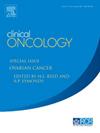The Use of Artificial Intelligence Technologies in Cancer Care
IF 3.2
3区 医学
Q2 ONCOLOGY
引用次数: 0
Abstract
Artificial intelligence (AI) is already an essential tool in the handling of large data sets in epidemiology and basic research.
Significant contributions to radiological diagnosis are emerging alongside increasing use of digital pathology. The future lies in integrating this information together with clinical data relevant to each individual patient. Linkage with clinical protocols will enable personalized management options to be presented to the oncologist of the future.
Radiotherapy has the distinction of being the first to have a National Institute for Health and Care Excellence (NICE)-approved AI-based recommendation. There is the opportunity to revolutionize the workflow with many tasks currently undertaken by clinicians taken over by AI-based systems for volume outlining, planning, and quality assurance.
Education and training will be essential to understand the AI processes and inputs. Clinicians will however have to feel confident interrogating the AI-derived information and in communicating AI-derived treatment plans to patients.
人工智能技术在癌症护理中的应用。
人工智能(AI)已成为流行病学和基础研究领域处理大型数据集的重要工具。随着数字病理学应用的不断增加,人工智能对放射诊断的重大贡献也正在显现。未来的关键在于将这些信息与每个病人的相关临床数据整合在一起。与临床方案的联系将使未来的肿瘤学家能够获得个性化的治疗方案。放疗是首个获得美国国家健康与医疗优化研究所(NICE)批准的基于人工智能的建议。目前由临床医生承担的许多工作都由人工智能系统接管,如量纲、计划和质量保证等,因此有机会彻底改变工作流程。教育和培训对于理解人工智能流程和输入至关重要。但是,临床医生必须有信心查询人工智能生成的信息,并将人工智能生成的治疗计划传达给患者。
本文章由计算机程序翻译,如有差异,请以英文原文为准。
求助全文
约1分钟内获得全文
求助全文
来源期刊

Clinical oncology
医学-肿瘤学
CiteScore
5.20
自引率
8.80%
发文量
332
审稿时长
40 days
期刊介绍:
Clinical Oncology is an International cancer journal covering all aspects of the clinical management of cancer patients, reflecting a multidisciplinary approach to therapy. Papers, editorials and reviews are published on all types of malignant disease embracing, pathology, diagnosis and treatment, including radiotherapy, chemotherapy, surgery, combined modality treatment and palliative care. Research and review papers covering epidemiology, radiobiology, radiation physics, tumour biology, and immunology are also published, together with letters to the editor, case reports and book reviews.
 求助内容:
求助内容: 应助结果提醒方式:
应助结果提醒方式:


